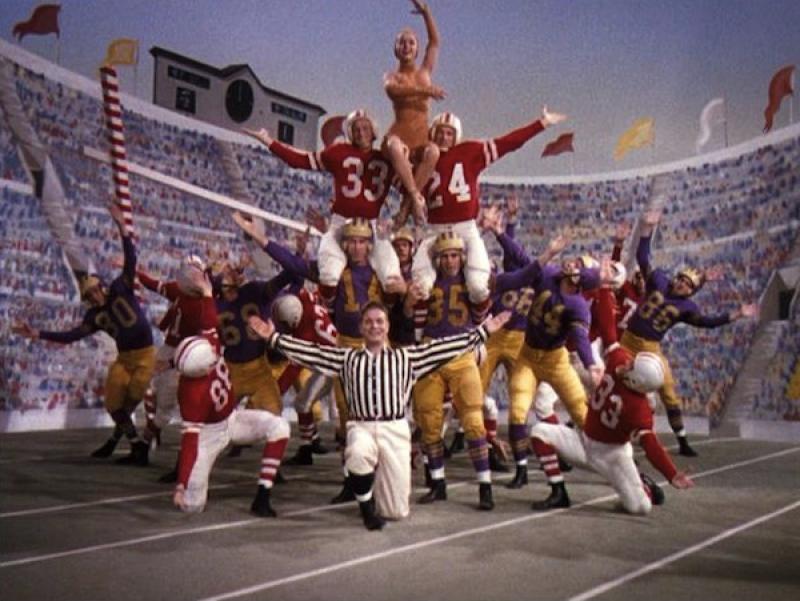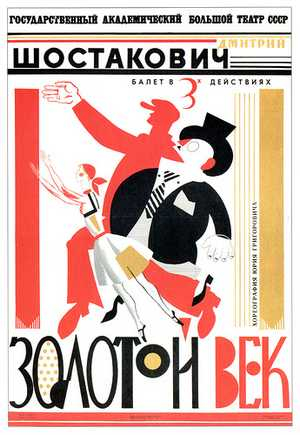theartsdesk Olympics: The Golden Age | reviews, news & interviews
theartsdesk Olympics: The Golden Age
theartsdesk Olympics: The Golden Age
Ballet and football have long been secret lovers, but are rarely seen out together in public

Rio Ferdinand did four years' ballet training as a child, England manager Graham Taylor sent the national squad to dance classes, while the Royal Ballet once ran an active football team. Ballet and football have long been secret lovers backstage. But they have only been rarely seen out together in public.
The tidy formations and rehearsed moves that please in dance theatre aren't compatible with the unpredictable spontaneity of football, and while kings of grace such as Ronaldinho, Zinedine Zidane or Dennis Bergkamp bring tears to the eyes with their individual flair, it's the overall arc of a team triumph that is more likely to be exploitable in music or dance.
Or so the Soviets thought in 1929, when Leningrad's state theatre announced a Soviet-wide competition to create a ballet libretto. The winning plot had a USSR national football team travel to Europe, resist "unhealthy eroticism" from Western corruptions (such as tea, tango and foxtrots), and win a triumphant victory. The Golden Age was to be a rallying call emphasising the greatness of the USSR and its youth, uniting its most exciting young composer, most distinguished choreographers and outstanding dancers in a fable whose messages all could readily understand.
 Dmitri Shostakovich was possibly the most avid football fan who ever became a composer. He was just 23, a vigorous new superstar in the musical firmament, full of youthful certainty and political optimism, seriously involved with young worker art and theatre. In the 1920s USSR culture was not the lividly oppressed propaganda machine it would become as Stalin tightened his grip, but an astonishingly vigorous and innovative period for lyric theatre by any light - The Bedbug, The Nose, The Golden Age, The Bolt, Lady Macbeth of Mtsensk were the young Shostakovich's lightning-bright creations for a bold new Soviet lyric theatre, and their cutting edge drew him fatally to the attention of Stalin, who moved swiftly to stop him in his tracks by force.
Dmitri Shostakovich was possibly the most avid football fan who ever became a composer. He was just 23, a vigorous new superstar in the musical firmament, full of youthful certainty and political optimism, seriously involved with young worker art and theatre. In the 1920s USSR culture was not the lividly oppressed propaganda machine it would become as Stalin tightened his grip, but an astonishingly vigorous and innovative period for lyric theatre by any light - The Bedbug, The Nose, The Golden Age, The Bolt, Lady Macbeth of Mtsensk were the young Shostakovich's lightning-bright creations for a bold new Soviet lyric theatre, and their cutting edge drew him fatally to the attention of Stalin, who moved swiftly to stop him in his tracks by force.
Shostakovich took the demand for uncontaminated new musical forms, pure Soviet creations in a new world free from Western shadows, as an aesthetic challenge. Yet how could he do so in this libretto? There was an obligation to portray "true, good, Soviet" in music, and "bad, decadent, Western", but the trick had to be to avoid making the Western stuff livelier or more seductive good fun than the righteous stuff. A horrible conundrum for a composer with a natural acerbity in his make-up and a limitless curiosity about jazz and other forbidden Western musical fruits. (Pictured left, the original poster.)
Needless to say, the musicians and the public adored the perverted Polka and the twisted Tahiti Trot - which is really "Tea for Two" - while the officials did not. (Below, listen to the Polka)
The staging, however, could not survive the brickbats thrown at it from every side. Chief culprit was the music - half the orchestra said it was needlessly tricky, the leading ballerina, the young starlet Galina Ulanova, said she couldn't dance to it, the committee of choreographers (four of them) united to blame the composer for their incoherent staging, while the designer could not get Shostakovich to tell her what the staging was intended to show.
After the Kirov Theatre premiere in October 1930 the composer wrote with annoyance to his friend, theatre director Nikolai Smolich, "I cannot defend my ballet convincingly since in regard to the artistic content I know I have written an anti-artistic work." In future, he said, he would only work with ideas that stimulated him imaginatively. His next ballet was a proper satire about the sabotage of a new factory machine, but the clock was ticking for him - six years later Stalin’s personal condemnation brought Shostakovich’s most original adventures in lyric theatre to an end.
I cannot defend my ballet convincingly. I know I have written an anti-artistic work
Yet football, at least, was non-political, and he could still find an excuse for composing music about it in 1944, for the NKVD Song and Dance Ensemble's revue Russian River. This was a surreal theatrical press-gang - the NKVD was the secret police (the KGB today), who were responsible for some of the worst threats to Shostakovich in the Thirties. The ensemble was an act of ownership over artists, who, once demobilised from war service, were obliged to answer a second call-up . When the NKVD head Beria, Stalin's right-hand man, ordered a frightened, starved Shostakovich to compose for them refusal was not to be contemplated, but the one number the composer voluntarily suggested was entitled "Football".
In the decades since then, and not just in Russia, the incongruity of football and ballet has become ingrained, loaded with sexuality connotations (which the occasional outing of gay footballers and heterosexual dancers has done little to quell). Here's Robin Williams inventing two fresh jokes in there:
Shostakovich's score never attracted a decent ballet staging - the Bolshoi Ballet chief Yuri Grigorovich ditched the footballing metaphor in his banal 1982 version, and the Kirov Ballet had a disaster with their 2006 production by Noah Gelber, which attempted to retain football metaphors but was humiliated by the critics. In this extract from a Bolshoi Ballet performance in 1988, listening to Shostakovich's tango is more rewarding than watching Grigorovich's choreography.
Buy
Explore topics
Share this article
The future of Arts Journalism
You can stop theartsdesk.com closing!
We urgently need financing to survive. Our fundraising drive has thus far raised £49,000 but we need to reach £100,000 or we will be forced to close. Please contribute here: https://gofund.me/c3f6033d
And if you can forward this information to anyone who might assist, we’d be grateful.

Subscribe to theartsdesk.com
Thank you for continuing to read our work on theartsdesk.com. For unlimited access to every article in its entirety, including our archive of more than 15,000 pieces, we're asking for £5 per month or £40 per year. We feel it's a very good deal, and hope you do too.
To take a subscription now simply click here.
And if you're looking for that extra gift for a friend or family member, why not treat them to a theartsdesk.com gift subscription?

Add comment